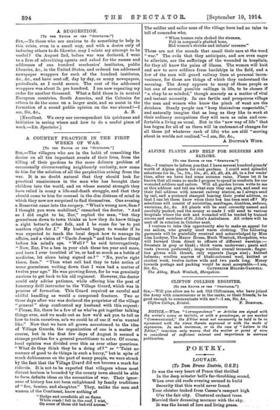A COUNTRY PRACTICE IN THE FIRST WEEKS OF WAR.
[To THE EDITOB. OP THE "SPECTATOR."]
Sin,—The villagers who are in the habit of consulting the doctor on all the important events of their lives, from the tilling of their gardens to the more delicate problem of occasionally circumventing neighbourly curiosity, now come to him for the solution of all the perplexities arising from the war. It is no doubt natural that they should look for practical omniscience in the man who has brought their children into the world, and on whose mental strength they have relied in many a life-and-death struggle, and that they should come to him for counsel in the dim distress of mind in which they now are surprised to find themselves. One evening a Reservist came into the surgery. "What's wrong now, Sam P I thought you were mobilized," remarked the doctor. "And so I did ought to be, Zur," replied the man, "but they gennelmen down to town thinks as how they do know things a zight better'n other folk, and I be come for 'ee to put matters right for I." My husband began to wonder if he was expected to teach the local depot how to manage its affairs, and a vision of "Uncle Joseph " and the banker flitted before his mind's eye. " Well P " he said interrogatively. " Now, Zur, I've a ben in your club these ten year and more, and have I ever troubled of 'ee, or had so much as a bottle of medicine, let alone being signed on P " " No, you're right there, Sam." " Then what call had they to take notice of some gennelman writing down that I were bad a matter of twelve year ago." He was growing fierce, for he was genuinely anxious to get back to his old regiment. However, the doctor could only advise patience, while offering him the post of honorary drill instructor to the Village Guard, which was in process of formation. This Guard required as careful and skilful handling as would a compound fracture. Two or three days after war was declared the proprietor of the village " general " shop confronted my husband with this request: " Please, Sir, there be a few of us who've got together talking things over, and we made out as how we'd ask you to tell us how to train ourselves, so's we could be of use if we'm wanted like." Now that we have all grown accustomed to the idea of Village Guards, the organization of one is a matter of course, but in the first few days of August it seemed a strange problem for a general practitioner to solve. Of course, local opinion was divided over this as over other questions. " What do they think they be a doing of P" or "'Taint no manner of good to do things in such a hurry," but in spite of much dubiousness on the part of many people, we were struck by the fact that the Village Guard did not become a mark for ridicule. It is not to be expected that villagers whose most distant horizon is bounded by the county town should be able to form definite ideas on the necessities of war. Their ignor- ance of history has not been enlightened by family traditions of " fire, famine, and slaughter." They, unlike the men and women of the Continent, know nothing of "Hedge and cornfields all on flame While crash ! fell in the roof, I wist, On some of those old bed-rid nurses."
The soldier and sailor eons of the village have had no tales to tell of comrades who,
"When human ruin choked the streams, Fell in conquest's glutted hour, Mid women's shrieks and infants' screams."
These are not the sounds that assail their ears at the word "war." The evils that they anticipate, and are even eager to alleviate, are the sufferings of the wounded in hospitals, for they all know the pains of illness. The women will knit and sew to save soldiers from hardships in the field, and a few of the men will guard railway lines at personal incon- venience, for these are things of which they understand the meaning. The Army appears to many of these people as but one of several possible callings in life, to be chosen if " a chap be so minded," though scarcely as a matter of vital and instant necessity. In one fertile and prosperous village the men and women who know the pinch of want are the drinkers. Steady people can " keep tbeirselves respectable," and naturally imagine that as long as they like to work at their ordinary occupations they will earn as calm and com- fortable a living as usual. But in the "new way of life" that has begun for all of us there will be undreamt-of changes for all those (of whatever rank of life) who are still "moving about in worlds not realized."—I am, Sir, &e., A DOCTOR'S WIFE.


































 Previous page
Previous page